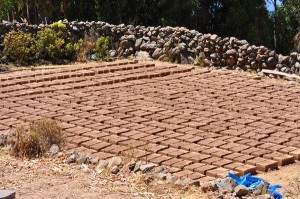The following is Part 4 of the article: “Bricks Without Straw“:
While the ideas for this article were being put together, my wife Julie mentioned that she thinks that people often avoid silence voluntarily because they are afraid of the sense of emptiness they will find during those times of silence. I agree. Noise and busyness are two things that can take our minds off God.
In contrast, Christian saints have cherished their times of silence and solitude. Thomas A Kempis taught his monks to find the joy of the Lord while alone and quiet in their cells. In his 15th Century work “Imitation of Christ“, he instructs us in his chapter on silence and solitude:
Remain with him in your cell for you will not find so great a peace anywhere else.
In Thomas’ time, the word “cell” did not have the meaning it does in our culture. In the 15th century , the word “cell” did not describe a place of confinement. Rather, it was a small room that served as a monk’s quarters. It took its name from the Latin word coelum, which means “heaven.” Those times of quiet and aloneness with God are not a time of confinement but rather a sampling of heaven and interacting with Our Lord Jesus who sits, at this moment, in Heaven at the right hand of His Father (Luke 22:69).
Discouragement is another way that we try to make “bricks without straw”. It will often cause us to channel our time and energies into self-pity. It can produce an inner numbness of the spirit. It deflects us away from focusing on doing the will of the Lord. The Bible offers an example of what can happen when discouragement sets in.
In the fourth chapter of the book of Ezra, we read about how the Israelites came back from exile in Babylon. They soon began to re-build the Temple. When political pressure mounted against them, the construction was forcibly stopped. The people became discouraged. The re-building of the Temple was not resumed for twenty years. The Israelites had inverted what Christ would teach centuries later:
Seek first His kingdom and His righteousness, and all these other things shall be added onto you.(Matthew 6:33)
They sought first “all these other things.” As a result, the other things failed. Keep in mind that money, food and houses are not evil. But it is evil to pursue them as a first priority.
Haggai reminded the Israelites that they needed to place God’s priorities first in their lives (See Haggai 1). What happened to those Israelites after their return from exile is a danger that we face as well. In our discouragement, we tend to take our minds away from the priority of Christ. Those other things that usurp God’s first priority in our lives will ultimately fail to satisfy us.
End of Part 4
Links to the previous entries for this article





